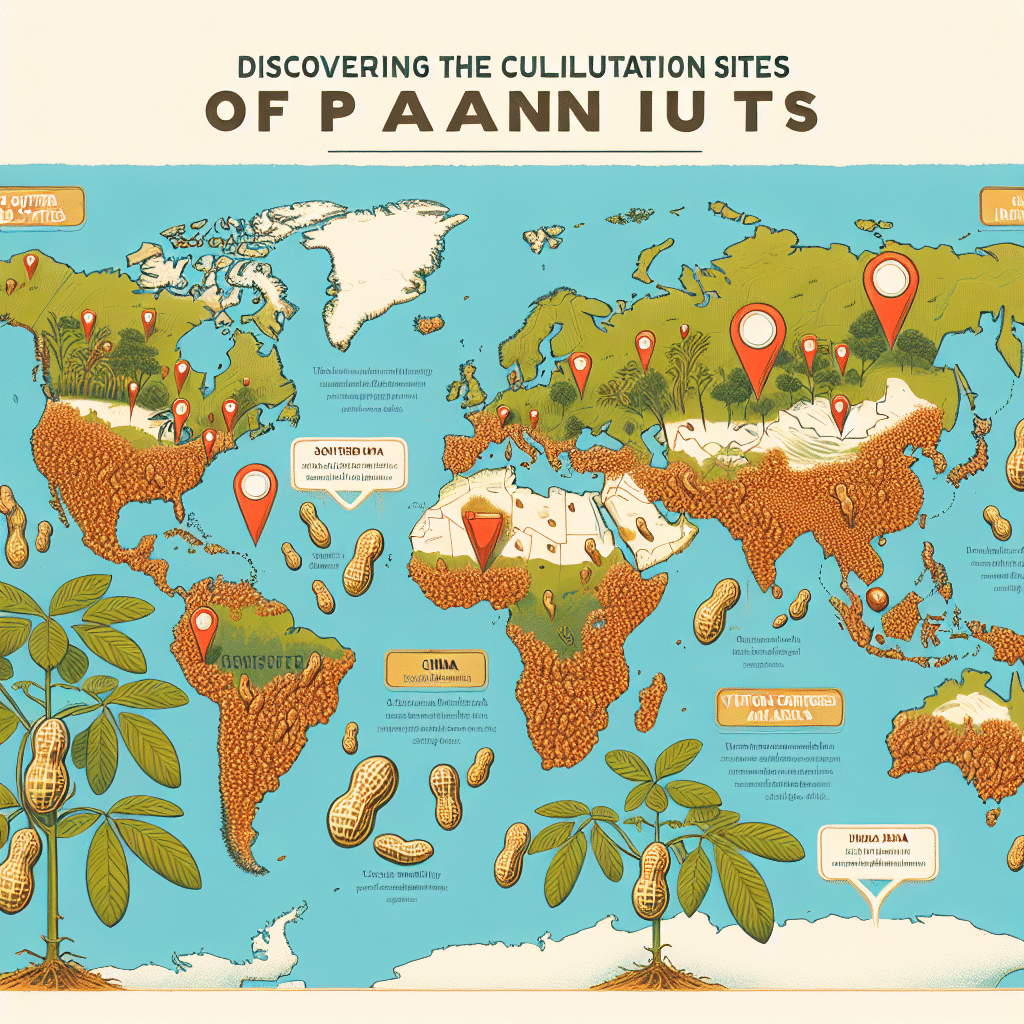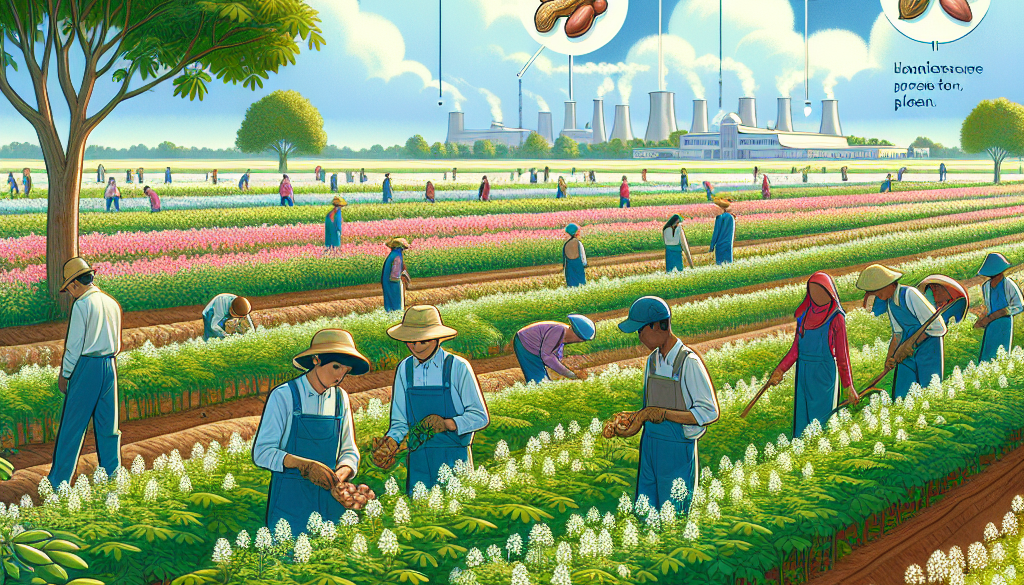Where Is Peanuts Grown: Unveiling The Cultivation Sites
-
Table of Contents
- Peanuts Cultivation Sites: Exploring Global Production Areas
- Understanding Peanut Cultivation
- Top Peanut Producing Countries
- Climate and Soil Requirements for Peanut Cultivation
- Impact on Local Economies
- Challenges in Peanut Farming
- Case Studies and Statistics
- Conclusion: The Global Footprint of Peanut Cultivation
- Discover ETprotein’s High-Quality Peanut Protein Products
Peanuts Cultivation Sites: Exploring Global Production Areas

Peanuts, also known as groundnuts, are a significant agricultural commodity grown in various parts of the world. The cultivation of peanuts is a critical economic activity for many countries, providing income for millions of farmers and contributing to the global food supply. In this article, we will explore the primary regions where peanuts are grown, the conditions required for their cultivation, and the impact of peanut farming on local economies.
Understanding Peanut Cultivation
Peanuts thrive in warm climates with well-drained soil. They require a growing season of about four to five months of warm weather, with temperatures ranging from 20°C to 30°C (68°F to 86°F). Peanuts are unique because they flower above the ground, but the peanuts themselves develop below the surface. This characteristic has earned them the name “groundnut.”
Top Peanut Producing Countries
The cultivation of peanuts is widespread, but certain countries are known for their large-scale production. Here are some of the top peanut-producing countries in the world:
- China: China is the largest producer of peanuts, contributing a significant portion of the world’s supply. The provinces of Shandong, Henan, and Hebei are particularly known for their peanut cultivation.
- India: India follows closely behind China in peanut production. The states of Gujarat and Andhra Pradesh are among the leading peanut-growing regions in the country.
- United States: The United States is also a major producer of peanuts, with the state of Georgia being the largest peanut producer, followed by Texas, Alabama, and Florida.
- Nigeria: Nigeria is the largest peanut producer in Africa, with the northern regions of the country being the primary cultivation areas.
- Indonesia: Indonesia is another significant peanut producer, with peanuts being grown on the islands of Java and Sumatra.
Climate and Soil Requirements for Peanut Cultivation
Peanuts require specific climatic and soil conditions to flourish:
- Climate: A warm climate with a long frost-free period is essential for peanut cultivation. The crop needs ample sunlight and moderate rainfall.
- Soil: Light, sandy loam soils with good drainage are ideal for peanut farming. The soil pH should be between 5.9 and 7.0 for optimal growth.
Impact on Local Economies
Peanut cultivation has a profound impact on the economies of producing countries. It provides employment opportunities and is a source of income for many smallholder farmers. Peanuts are not only consumed as food but also processed into various products such as peanut oil, peanut butter, and snacks, contributing to the agro-industrial sector.
Challenges in Peanut Farming
Despite its economic importance, peanut farming faces several challenges:
- Diseases and Pests: Peanuts are susceptible to various diseases and pests, which can significantly reduce yields.
- Climate Change: Changes in weather patterns can affect peanut production, with droughts or excessive rainfall being particularly detrimental.
- Market Fluctuations: The price of peanuts can be volatile, affecting the income stability of farmers.
Case Studies and Statistics
Let’s look at some specific examples and statistics to understand the global peanut industry better:
- In the United States, the peanut industry contributes over $4 billion to the economy and provides over 50,000 jobs.
- In China, peanut farming has helped lift many rural areas out of poverty, with the country producing over 16 million metric tons annually.
- In India, innovative farming techniques have increased peanut yields, with the country producing around 6 million metric tons per year.
Conclusion: The Global Footprint of Peanut Cultivation
Peanut cultivation is a global enterprise that spans continents and climates. From the vast fields of China and India to the specialized farms in the United States, peanuts are a crop that supports economies, provides nutrition, and continues to be a staple in diets worldwide. The challenges faced by peanut farmers, such as disease management and climate change, are significant but are being addressed through research and sustainable farming practices.
The key takeaways from this exploration of peanut cultivation sites are the adaptability of the crop, its economic significance, and the ongoing efforts to improve peanut farming methods to ensure a stable and sustainable supply.
Discover ETprotein’s High-Quality Peanut Protein Products
If you’re interested in incorporating peanut protein into your diet or product line, ETprotein offers a range of high-quality peanut protein products. Their peanut protein is characterized by a neutral taste and non-GMO, allergen-free attributes, making it an excellent choice for various applications in the food and beverage industry.
ETprotein’s commitment to quality and customer satisfaction makes them a preferred supplier for those seeking reliable and nutritious plant-based protein options. Whether you’re a manufacturer, trader, or distributor, ETprotein can meet your protein needs with their extensive product range.
About ETprotein:
ETprotein, a reputable protein Chinese factory manufacturer and supplier, is renowned for producing, stocking, exporting, and delivering the highest quality organic bulk vegan protein and plant proteins. They include Organic rice protein, clear rice protein, pea protein, clear pea protein, pumpkin seed protein, sunflower seed protein, mung bean protein, peanut protein etc. Their offerings, characterized by a neutral taste, non-GMO, allergen-free attributes, cater to a diverse range of industries. They serve nutraceutical, pharmaceutical, cosmeceutical, veterinary, as well as food and beverage finished product distributors, traders, and manufacturers across Europe, USA, Canada, Australia, Thailand, Japan, Korea, Brazil, and Chile, among others.
ETprotein specialization includes exporting and delivering tailor-made protein powder and finished nutritional supplements. Their extensive product range covers sectors like Food and Beverage, Sports Nutrition, Weight Management, Dietary Supplements, Health and Wellness Products, and Infant Formula, ensuring comprehensive solutions to meet all your protein needs.
As a trusted company by leading global food and beverage brands and Fortune 500 companies, ETprotein reinforces China’s reputation in the global arena. For more information or to sample their products, please contact them and email sales(at)ETprotein.com today.














